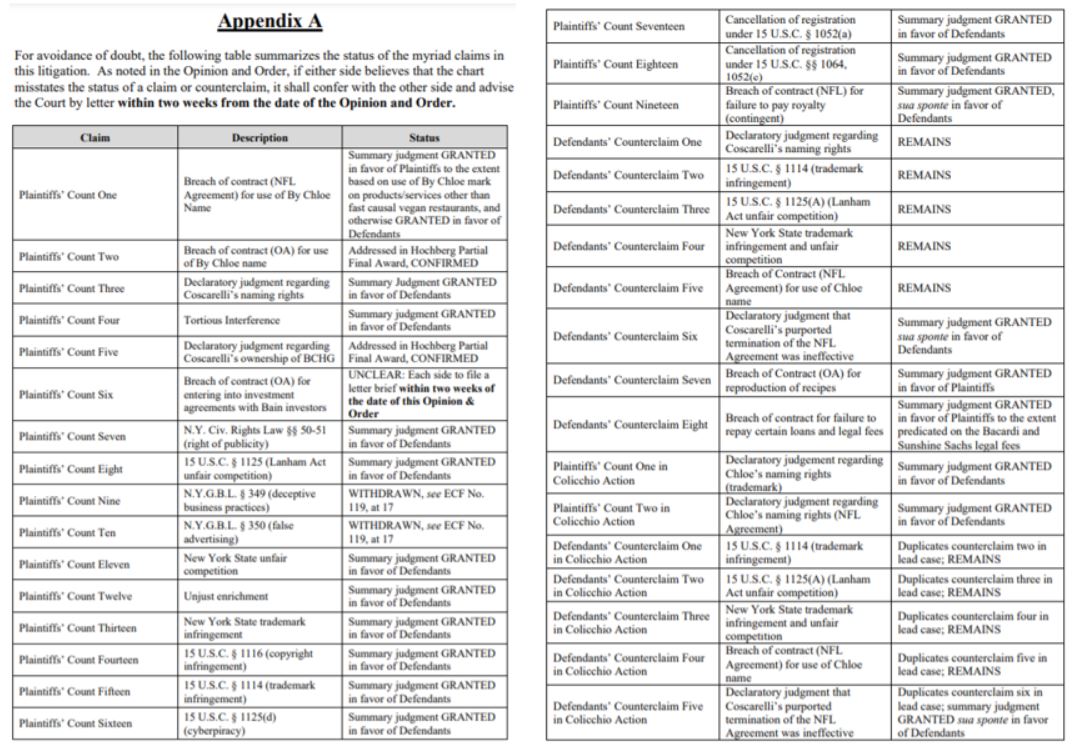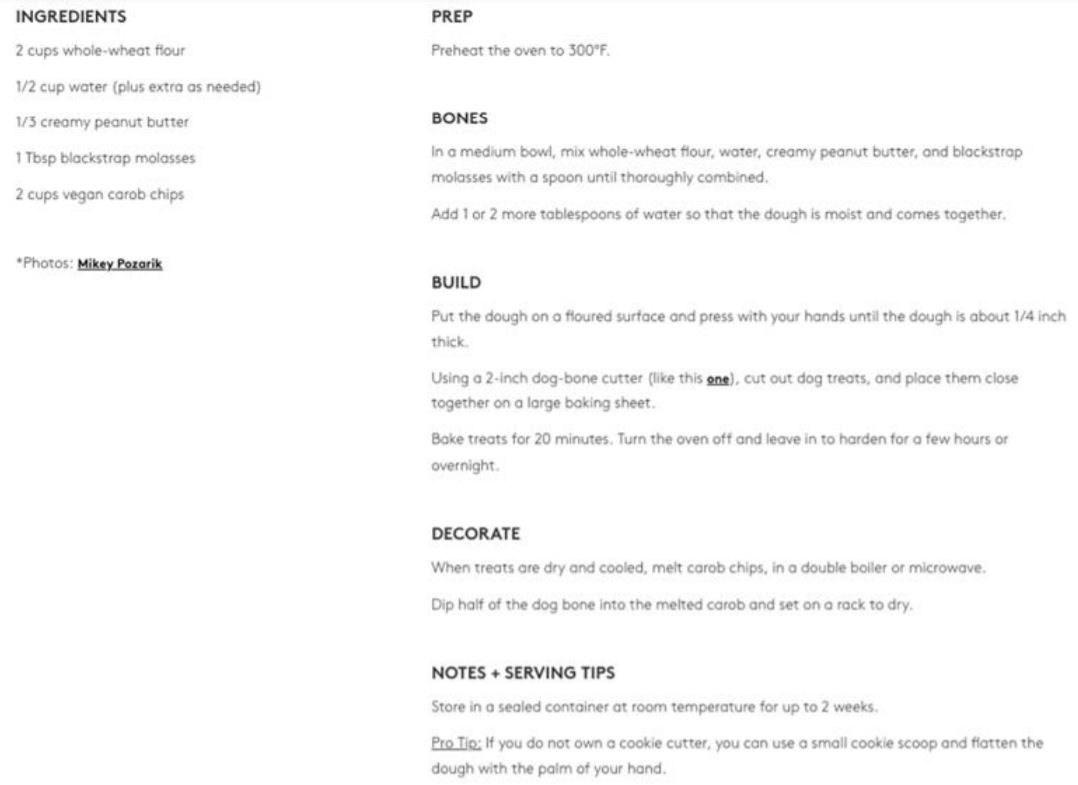Recipes Aren’t Copyrightable, No Matter How “Exciting” They Are–Coscarelli v. Esquared
This case involves vegan chef Chloe Coscarelli, the first vegan to win Food Network’s Cupcake Wars. That win made her a legend in the vegan community, and she has parlayed her fame into some great vegan cookbooks.
She also connected with a management group to build a vegan fast-casual restaurant chain called “By Chloe.” Unfortunately, that relationship did not go well. It has cratered into a fireball of litigation that doomed the restaurant chain (e.g., this article) and is now generating truckloads of cash for many lawyers. It’s so complicated that the judge made an appendix recapping the status of dozens of claims:
This post focuses on a sliver of the sprawling litigation empire. Chloe asserted copyright claims against the management group for posting her recipes to its website. Normally I’m Team Vegan all the way, but I exit Team Chloe when I see a low-merit copyright claim like this.
The court starts with the standard legal treatment of recipes:
Applying the fact/expression dichotomy to recipes, courts have held that “the lists of required ingredients and the directions for combining them to achieve the final products” are not eligible for copyright protection, although original elements reflecting the author’s creative expression – such as “musings about the spiritual nature of cooking,” “reminiscences [the author] associate[s] with the wafting odors of certain dishes in various stages of preparation,” and “suggestions for presentation, advice on wines to go with the meal, or hints on place settings and appropriate music” – may be protectible.
The application of this principle to this case is easy:
the elements that Defendants allegedly copied from Coscarelli’s cookbooks are primarily lists of ingredients and directions for combining them. For example, Plaintiffs allege that Defendants copied, nearly verbatim, the ingredients and steps in the recipe for peanut butter dog treats that Coscarelli published in her Chloe’s Kitchen cookbook. But – critically – they make no argument that the commentary (stating, “Now, something for our furry friends! There’s a whole lot of tail-waggin’ and lip-smackin’ when my pups smell these all-natural treats baking. These also make great gifts: Wrap these treats and, when you tie them off, attach a dog-bone cookie cutter and a copy of this recipe”) was copied. Whereas the latter may be entitled to copyright protection, the former plainly is not.
Chloe claimed that her recipes deserved more favorable copyright treatment because the recipes were “exciting, unique – and above all – original,” not “simple and unoriginal.” Really? The court didn’t share Chloe’s enthusiasm. Even the most exciting and unique recipe instructions and ingredient lists are still just facts.
Team Chloe includes attorneys of record from three different law firms. Yet, none of them successfully discouraged a copyright claim over recipes… 😢
- Carly Ann Kessler, Oppenheim & Zebrak, LLP [she changed her name to Carly Kessler Rothman]
- Kristine Allison Tietz, Robins Kaplan L.L.P. (MN) (left the case in 2019)
- Lisa Marie Coyle, Akerman LLP
- Patrick M. Arenz, Robins Kaplan L.L.P. (MN)
- Frederick Andrew Braunstein, Akerman LLP (left the case in 2021)
- Reena Jain, Akerman LLP (left the case in 2021)
- Ronald J. Schutz, Robins Kaplan LLP
A 505 fee shift would be a small but logical step for the judge to signal his disappointment with the unnecessary multiplication of this litigation.
BONUS: the court also denies Chloe’s attempt to kibosh the “bychefchloe” domain name and social media handles because she consented to their use:
Coscarelli herself “suggested” that BCHG “try[] to secure @bychefchloe as a Twitter handle” and “believed it was a ‘fine idea’ that [BCHG] use bychefchloe as an internet domain and for its social media handles, given the unavailability of ‘bychloe’ for such purposes.”
Her inability to control social media accounts referencing her reminded me of the Hayley Paige Gutman litigation, and I will say more about this issue when I blog the JW Dant bourbon case. If you’re selling your personality rights, make sure you understand the implications!!!
Case citation: Coscarelli v. Esquared Hosp., 18-CV-5943 (JMF) (S.D.N.Y. Nov. 24, 2021). The CourtListener page. The operative First Amended Complaint, para. 192, shows images of the recipes at issue.
* * *
Because copyright law lets me, I’m reproducing the dog treats recipe below. To be honest, they sound tasty enough that I would try them myself. 🐶 A reminder: carob is OK for dogs, but chocolate can be toxic to them.
Vegan Peanut Butter Dog Treats from Chloe Coscarelli
Here’s how the recipe appeared on the defense website:
If that’s too hard to read, here are the key pieces:
(Makes about 50 treats)
2 cups whole wheat flour
½ cup water, plus extra as needed
1/3 creamy peanut butter, softened
1 tablespoon blackstrap molasses
2 cups vegan carob chips, optional
Preheat the oven to 300 degrees.
In a medium bowl, mix flour, water, peanut butter, and molasses with a spoon until thoroughly combined. Add 1 or 2 more tablespoons water so that dough comes together and is moist. Put the dough on a floured surface and press with your hands until the dough is about ¼-inch thick. Using a 2-inch dog-bone cookie cutter, cut out dog treats, and place them close together on a large baking sheet.
Bake treats for 20 minutes. Turn off oven and leave them in the oven to harden for a few hours or overnight.
When treats are dry and cooled, melt carob chips, if using, in a double boiler or microwave. Dip half of the dog bone into the melted carob and set on a rack to dry. Store in a sealed container at room temperature for up to two weeks.
* * *
Some Related Blog Posts
- Why Are Pizzerias Arguing Whether Web Browsing Is Copyright Infringement?–Imapizza v. At Pizza
- Newspaper Can Talk About “Derby Pies” Without Infringing Trademarks–Rupp v. Courier Journal
- Vegetarian Ethiopian Cookbook Copyright Lawsuit Turns Sour–Schleifer v. Berns
- Doubling (& Tripling) Down on Trademark Protection For Secret Menu Items–In-N-Out v. Smashburger (Guest Blog Post)
- Food Flavor Can’t Be Trademarked (Even If The Baked Ziti Is Delicious)–NY Pizzeria v. Syal
- Book Review: “The Little Book of Foodie Law”
- Food Tastes Better When Branded “McDonalds”
Also, the First Circuit ruling with the classic line, “a chicken sandwich is not eligible for copyright protection.”



Pingback: RECIPE FOR FAILED COPYRIGHT LITIGATION - Graydon Law()